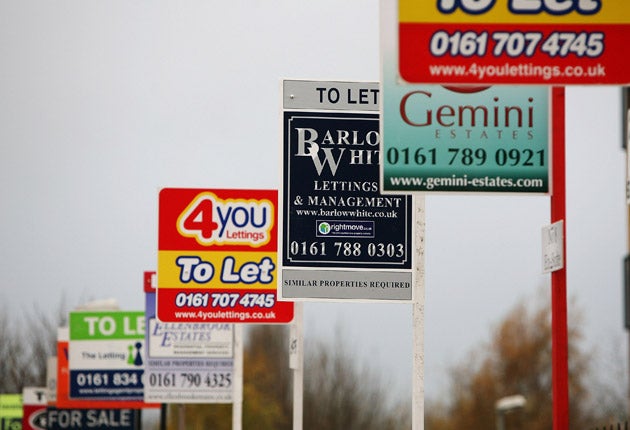House prices resume downward trend

Your support helps us to tell the story
From reproductive rights to climate change to Big Tech, The Independent is on the ground when the story is developing. Whether it's investigating the financials of Elon Musk's pro-Trump PAC or producing our latest documentary, 'The A Word', which shines a light on the American women fighting for reproductive rights, we know how important it is to parse out the facts from the messaging.
At such a critical moment in US history, we need reporters on the ground. Your donation allows us to keep sending journalists to speak to both sides of the story.
The Independent is trusted by Americans across the entire political spectrum. And unlike many other quality news outlets, we choose not to lock Americans out of our reporting and analysis with paywalls. We believe quality journalism should be available to everyone, paid for by those who can afford it.
Your support makes all the difference.House prices resumed their downward trend during April as the property market remained volatile, figures showed today.
The average home lost 0.2% of its value during the month, leaving it costing £165,609, according to Nationwide Building Society.
The fall follows two consecutive months during which prices have risen, although property values have dropped in three of the previous six months, while they have increased during three of them, showing the current unsettled state of the market.
Robert Gardner, Nationwide's chief economist, said: "It is not unusual to see a pattern of modest monthly increases and decreases when the market is fairly static, as has been the case since last summer."
But he added that there was little evidence to suggest that house price falls would accelerate in the coming months, despite the fragile state of the economy.
Instead, he said the economic recovery was expected to gain momentum, and despite households' budgets remaining under pressure, low interest rates and an improving labour market should help to provide support for housing demand.
He said: "Nevertheless, a strong rebound in the market remains unlikely, as the recovery is still expected to remain modest by historic standards.
"In our view, the most likely outcome is that house prices will continue to move sideways or drift modestly lower through 2011."
The latest monthly drop left house prices 1.3% lower than they were in April 2010, the biggest year-on-year decline since January.
But the quarter-on-quarter change, which is often seen as a smoother indicator of market trends, showed a 0.6% rise during the three months to the end of April, the highest level since July last year.
Figures released by the British Bankers' Association last week showed that the number of mortgages approved for house purchase had risen to an eight-month high during March, as activity in the property market showed signs of picking up.
But at 31,660, the figure was still well down on the 70,000 to 80,000 approvals a month that are considered to be consistent with a stable housing market.
Howard Archer, chief UK and European economist at IHS Global Insight, said: "The renewed fall in house prices reported by the Nationwide in April is consistent with our view that house prices will trend down gradually overall through the rest of 2011 and, very possibly, the early months of 2012 as tighter fiscal policy and the likelihood of gradually rising interest rates before the end of 2011 pressurise the housing market.
"On top of that, high unemployment, negative real income growth, elevated debt levels and still significant difficulties in getting a mortgage (particularly for first-time buyers) do not bode well for house prices.
"Meanwhile, although there are signs that housing market activity has edged off its lows recently, it is still at a very weak level that historically has been associated with falling house prices."
The Land Registry also released data today showing that house prices in England and Wales fell at their fastest rate for two years during March.
The average cost of a home dropped by 1.1% in the month, the biggest decline since February 2009, to stand at £160,996.
The fall, the sixth decline in the past seven months, left house prices 2.3% lower than a year earlier, the steepest annual drop since October 2009.
There was also a steep fall in transactions, with the number of homes changing hands diving by a third to 36,425 in January - the latest month for which figures are available.
However, January is often a weak month for property sales, and this January was likely to have been particularly subdued following the severe winter weather in December.
All regions of England and Wales recorded price falls in March, apart from the North West, where the average cost of a home rose by 0.7%.
Wales and the East Midlands saw the most severe price slides at 3.3% and 2.5% respectively.
London is the only region in which prices are higher than they were a year ago, and even there they have only edged ahead by just 0.8%.
The North East has seen the biggest annual drop at 9.3%, while in Wales house prices are 7.2% lower than they were a year ago.
Join our commenting forum
Join thought-provoking conversations, follow other Independent readers and see their replies
Comments